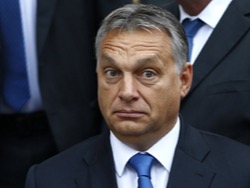
In the coming weeks all the attention European leaders will be focused on Britain, whose citizens will soon decide whether to stay or not their country in the European Union. But this is not the only threat to the unity of the EU. Problems are also brewing in Budapest.
Prime Minister of Hungary Viktor Orban has long been hardened eurosceptic. Coming in 2010 to power, he has made it clear that there is no love between him and Brussels will not. At every opportunity he hastens to curse the leaders of the European Union — and they often reciprocate.
But lately, Orban brought the situation to a whole new level, forcing opposition parties to act with caution about its plans to exclude Hungary from the EU. Although his position on this issue is far from clear, there are numerous signs that Orban wants to review the status of Hungary within the EU.
It was not always so. When Orban was a passionate supporter of Europe. It was he who led the negotiations on Hungary’s accession to the EU in its first term Prime Minister from 1998 to 2002. But going later in the opposition, Orban began to change their views. He saw for himself the opportunity to respond to the growing antiglobalization and anti-European sentiments of Hungarians, many of them believe that EU membership has not given them that prosperity for which they hoped.
To power, Orban returned in 2010, firmly fixed on antiglobalization and antibrucella political platform. Since then, he regularly demonstrates his contempt for European values. He takes the laws seriously restricting freedom of the independent media and impose additional taxes on operating in Hungary from the EU. Orban has openly stated that his goal is to turn Hungary into an illiberal democracy. As laudable examples he cites Turkey, Russia and China. Taking advantage of immigration crisis, he became known as a pan-European leader of the hardliners, whose purpose is to build fences and protect the “European fortress”. In this case, Orban makes it clear that Brussels do it. And although his right-wing party Fidesz is still part of the European people’s party, which is a conservative Alliance of the main directions in the European Parliament, Orban clearly becomes a burden even for their long-standing allies such as the Christian democratic Union of German Chancellor Angela Merkel.
Recent statements reinforce Orban’s concern about his intentions. Recently he, along with leading members of his party began to refer to Hungary’s membership in the EU “purely a business issue.” This was a red rag for those European leaders who see the EU first of all the most important political project. In a recent interview the head of the office of the Prime Minister Janos Lazar (Janos Lazar), who is considered a possible successor to Orban also praised the Hungarian membership in the EU as a purely economic issue. This is a well calculated provocation. If the EU is just a business, then there is no reason to take a pan-European policy on the refugee crisis. Accordingly, quota refugees, too, need to be abandoned.
Needless to say that the crisis was in the hands of Orban powerful and efficient anti-European trumps. In a recent radio interview he said that Europe has ceased to be a safe place for his fellow-Hungarians, stressing that the EU’s position on the issue of migration has led to a “revolt of immigrants”, “the burning of the refugee camps” and that the “gang of Hungarian migrants is plagued women — our wives and daughters.”
These comments came a few days after treatment Orban to the nation on 1 March in which the Prime Minister has reshaped the debate on migration policy, calling them an epic battle between “the Europe of the free Nations” (the countries-supporters of national sovereignty, which includes Hungary) and the Federalists, sitting in Berlin, Brussels and Paris. The latter, Orban said, believe in quotas for immigrants, they will turn Europe into a sort of Caliphate, beginning a frontal attack on her Christian values. Left opposition party immediately accused the Orban that he prepares the soil “for the withdrawal of Hungary from the EU”, referring to his plan to hold this year’s referendum on quotas for European refugees. This initiative clearly aims to give the Prime Minister a popular mandate to fight against Brussels.
Although this referendum was a flagrant violation of the rules of the EU, Orban is a great way to strengthen the position of his party in the fight against the main enemy — the extreme right party “Jobbik” (“For a better Hungary”). The next elections in Hungary will take place in 2018. So, naturally, Orban is highly practical reasons to do against EU populism.
But his criticism of Brussels cannot be called pure populism because there is a strong ideological element. It is enough to recall his affection for Vladimir Putin. The rapprochement of Hungary with Moscow has become a Central part of foreign policy of Orban. Last year Moscow gave Budapest a large loan of 10 billion euros. The money was supposedly allocated for the expansion of the only Hungarian nuclear power plant, however, some observers see this deal as a part of actions of the Kremlin to strengthen its influence on the Hungarians.
Meanwhile, talking about Orban’s illiberal democracy is much more like Moscow than Brussels. When it comes to values and sign language, Hungarian Prime Minister feels more comfortable in the company of Putin than someone from Brussels. During the recent visit by Orban to Moscow Putin and the Russian media praised him for his criticism of the EU, and the Russian President stated that “protection of the European identity” bothers him not less than Orban. In fact, orbán’s policies could be called “evolutionism”: thug capitalism in the economy, semi-authoritarian politics. The former once the most liberal member of the Soviet bloc, Hungary is again turned into a white crow, but this time in the EU.
Does this mean that Orban really is maneuvering for the purpose of withdrawal of Hungary from the EU? Probably not. Full withdrawal of the country from the European Union will almost certainly prove unpopular among voters. Most likely, Orban needs a certain distance between Budapest and Brussels. He is clearly against the deepening political and economic integration between the current EU members. Judging by his actions, Orban sees Hungary’s future on the edge of the EU, and confers on her the role of a connecting bridge between East and West. He wants the country continued to enjoy the benefits of EU membership, and simultaneously moved closer to Russia. But so far it is unclear whether he will manage to build such a squaring of the circle.








